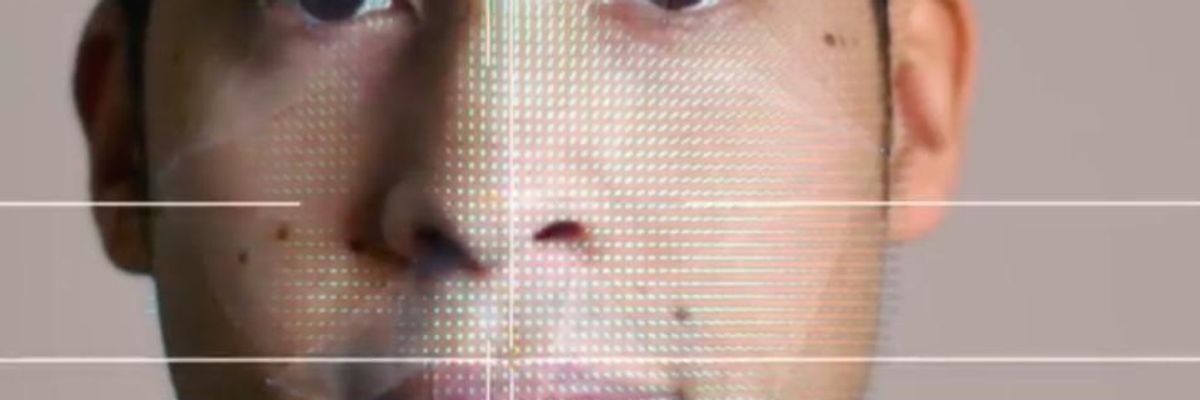Urging universities across the U.S. to reject sales pitches from technology companies that insist facial recognition technology makes campuses safer, digital rights group Fight for the Future on Thursday released a sign-on letter calling for a ban on the use of surveillance which the group says violates students' and faculty's civil liberties.
Fight for the Future (FFTF) was joined by more than 40 other rights organizations including the ACLU, the National Immigration Law Center, and the National Center for Transgender Equality in warning that the use of the technology--which at least two large universities in the U.S. currently implement--puts not only privacy rights at risk but also racial justice and immigrants' rights.
"Just imagine you're in college--exploring new ideas, meeting new people, going to parties, dating, attending rallies. Now imagine doing all of that while under constant surveillance, not knowing who is watching you, what's happening to your biometric data, or what the implications of that may be."
--Evan Greer, FFTF
"Facial recognition technology isn't safe," reads the letter. "It's biased and is more likely to misidentify students of color, which can result in traumatic interactions with law enforcement, loss of class time, disciplinary action, and potentially a criminal record... Facial recognition is invasive, enabling anyone with access to the system to watch students' movements and analyze facial expressions, as well as monitor who they talk to, what they do outside of class, and every move they make."
Universities, the groups wrote, are ill-equipped to protect data collected by facial recognition surveillance from hackers, leaving images of students and faculty vulnerable to ending up in the hands of entities that might target and harm them.
On social media, FFTF called on college students to loudly oppose the use of the technology at their schools.
"With facial recognition your administration could track everywhere you go on campus--who you hang out with, what you believe, where you party, who you hook up with. They could even grade you based on what your face looks like and then store that info forever," the video's narration says.
"Just imagine you're in college--exploring new ideas, meeting new people, going to parties, dating, attending rallies," said Evan Greer, deputy director of FFTF. "Now imagine doing all of that while under constant surveillance, not knowing who is watching you, what's happening to your biometric data, or what the implications of that may be. There is no way to protect students' rights and ability to thrive at college when the school uses facial recognition technology."
FFTF also released a scorecard listing nearly 100 top colleges in the U.S. and detailing their commitments to banning facial recognition on campus--and the plans some schools have to use the technology.
While dozens of schools including Columbia University, Boston College, and Kent State University confirmed they have no plans to use the surveillance on campus, Tufts University and UCLA both have plans to introduce the technology.
Stanford and University of Southern California are both currently using facial recognition while several schools didn't confirm their plans. In addition to the letter and scorecard, FFTF announced this week it would lead a National Day of Action to Ban Facial Recognition from College Campuses on March 2, organizing public actions at schools around the country.
The group slammed "unscrupulous" companies for their claims that facial recognition surveillance will make schools safer.
As Fast Companyreported last month, a company called FaceFirst is marketing "monitoring packages" to schools.
Public school systems, FFTF wrote, are already experimenting with facial recognition technology that is being deployed not to keep schools secure but to punish students.
"School administrators have already admitted to using this technology to target students for being late or minor rule breaking," reads the letter.
A company called Face Six sells facial recognition technology aimed at helping instructors keep track of classroom attendance.
Such companies are "aggressively marketing their tech to colleges and claiming that facial recognition can increase campus safety, streamline attendance, and even measure whether students are paying attention. But the truth is there is no justifiable reason to use it," said Greer. "Claims that it increases safety are unfounded, and using it as a tool of convenience puts the privacy and rights of students and faculty at risk, for little-to-no benefit."
FFTF and other groups have called for a federal ban on facial recognition technology, in addition to their campaign targeting colleges.
"This mass surveillance experiment does not belong in our public spaces, and certainly not in our schools," said Jake Martinez, director of youth programs at the New York Civil Liberties Union. "Students should not have to give up their privacy and take part in this dangerous project as a prerequisite to stepping foot on campus."

